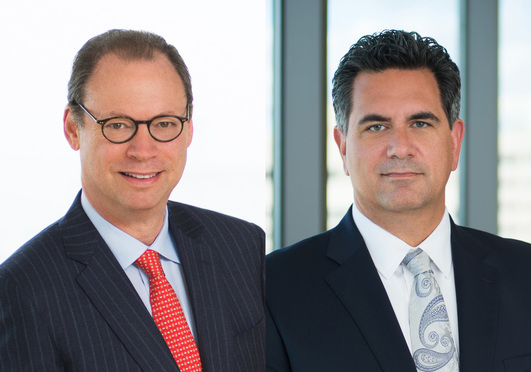Andrew C Kassner And Joseph N Argentina Jr

October 18, 2018 | The Legal Intelligencer
Court Examines Value in Parent Guaranty and Affiliate Debt PaymentVendors are often confronted with the classic dilemma when a customer becomes financially distressed and falls behind. Do they continue to do business with the customer and attempt to obtain credit support, which may be the better way to get paid—or “cut the cord,” terminate the relationship, and initiate collection?
By Andrew C. Kassner and Joseph N. Argentina, Jr.
7 minute read

September 06, 2018 | The Legal Intelligencer
Fishing in the Waters of Bankruptcy Rule 2004The trustee in bankruptcy acts as a fiduciary for all creditors to identify assets and administer the bankruptcy estate. Usually the trustee…
By Andrew C. Kassner and Joseph N. Argentina Jr.
9 minute read

July 12, 2018 | The Legal Intelligencer
Ninth Circ. Reviews Whether Claims Purchased in Good Faith to Block Chapter 11 PlanIt is interesting for one who has practiced bankruptcy law for 35 years to observe that many issues adjudicated in 1983 continue to require judicial review in 2018.
By Andrew C. Kassner and Joseph N. Argentina Jr.
1 minute read

June 06, 2018 | The Legal Intelligencer
Opt-Out Mechanism Enables Substantive Consolidation Under Chapter 11 PlanSubstantive consolidation is a procedure that can be implemented by a bankruptcy court to treat two or more debtors in bankruptcy as one entity by pooling the assets and claims of the entities, eliminating inter-company claims, and combining the creditors of the entities for purposes of voting and distribution on and under a Chapter 11 plan of reorganization.
By Andrew C. Kassner and Joseph N. Argentina Jr.
1 minute read

March 06, 2018 | The Legal Intelligencer
Rent-A-Wreck Crash Into Bankruptcy Dismissed for Lack of Good-Faith FilingThe U.S. Bankruptcy Code provides distressed companies an array of tools to reorganize their business affairs and restructure their debt.
By Andrew C. Kassner and Joseph N. Argentina Jr.
10 minute read

January 08, 2018 | The Legal Intelligencer
Involuntary Proceeding Suspended to Permit Disposition of State Court LitigationMost bankruptcy cases are commenced by the filing of a “voluntary” bankruptcy petition by the debtor. In fact, as we have reported previously, today the bankruptcy process is dominated by prearranged restructurings involving advance planning and negotiations with potential purchasers and stakeholders that result in the business aspects of the bankruptcy process being substantially finalized at the time of the filing.
By Andrew C. Kassner and Joseph N. Argentina Jr.
9 minute read

October 19, 2017 | The Legal Intelligencer
Parking Authority Sanctioned for Causing Emotional Distress From Car TowingOne of the fundamental benefits of the filing of a bankruptcy case is the imposition of the “automatic stay” that bars creditor actions to continue collection of pre-petition debts without first obtaining relief from the stay from the bankruptcy court.
By Andrew C. Kassner and Joseph N. Argentina Jr.
7 minute read

September 13, 2017 | The Legal Intelligencer
Court Adopts 'Probable' Standard for WARN Act NoticingBankruptcy cases are often filed after a distressed company has determined the only way for the business to survive as a going concern is to pursue a sale. The sale process is conducted prior to the filing, and the case is filed, together with a request that the court approve the sale of the company pursuant to the terms of the negotiated sale agreement unless a higher offer is received. Often there is no alternative, and the question is whether the sale to the bidder will be approved and closed. If it does not close and the company is forced to liquidate, other federal laws may come into play.
By Andrew C. Kassner and Joseph N. Argentina Jr.
18 minute read

July 14, 2017 | The Legal Intelligencer
Independent Director Tacitly OKs Bankruptcy by Silent RatificationOver the years, the real estate industry relied heavily on securitization vehicles to finance commercial real estate projects. The loans are packaged and then sold in pools to investors. Various mechanisms have been developed to facilitate collection of the loans without the uncertainty of a borrower bankruptcy filing that could delay and increase the costs of collection. Lenders in these secured transactions often use special purpose entities, or SPEs, to attempt to limit the risk of a borrower bankruptcy filing. While these structures can vary, the concept is to create a separate corporate entity whose only purpose and asset is the one real estate project, and the only significant obligation is the mortgage loan. The SPE is isolated from the financial affairs of the corporate parent or affiliates. The lender requires the borrower to appoint an independent director to the board from a mutually acceptable source, and unanimous board approval for certain key decisions, such as the decision to file for bankruptcy. Consequently, a lender is able to reduce the risk of delay after default and high costs of collection, and the borrower benefits from lower interest rates and fees from the lower cost loan.
By Andrew C. Kassner and Joseph N. Argentina Jr.
16 minute read

June 08, 2017 | The Legal Intelligencer
Post-'Jevic,' Expansive Interpretation by Bankruptcy Courts PossibleIn our last column we reported on the U.S. Supreme Court's decision in Czyzewski v. Jevic Holding, 137 S. Ct. 973 (2017). In that decision, the court ruled a bankruptcy court may not order a structured dismissal of a Chapter 11 case that provides for estate assets to be distributed in violation of the Bankruptcy Code's distribution scheme. The decision was widely discussed by bankruptcy practitioners, in part because there are a number of common practices in Chapter 11 that also distribute estate assets in violation of the bankruptcy code's distribution scheme.
By Andrew C. Kassner and Joseph N. Argentina Jr.
8 minute read
Trending Stories
- 1Call for Nominations: Elite Trial Lawyers 2025
- 2Senate Judiciary Dems Release Report on Supreme Court Ethics
- 3Senate Confirms Last 2 of Biden's California Judicial Nominees
- 4Morrison & Foerster Doles Out Year-End and Special Bonuses, Raises Base Compensation for Associates
- 5Tom Girardi to Surrender to Federal Authorities on Jan. 7
More from ALM
- Scan In Progress: Litigators Leverage AI to Screen Prospective Jurors 1 minute read
- Legal Speak at General Counsel Conference East 2024: Match Group's Katie Dugan & Herrick's Carol Goodman 1 minute read
- Legal Speak at General Counsel Conference East 2024: Eric Wall, Executive VP, Syllo 1 minute read



